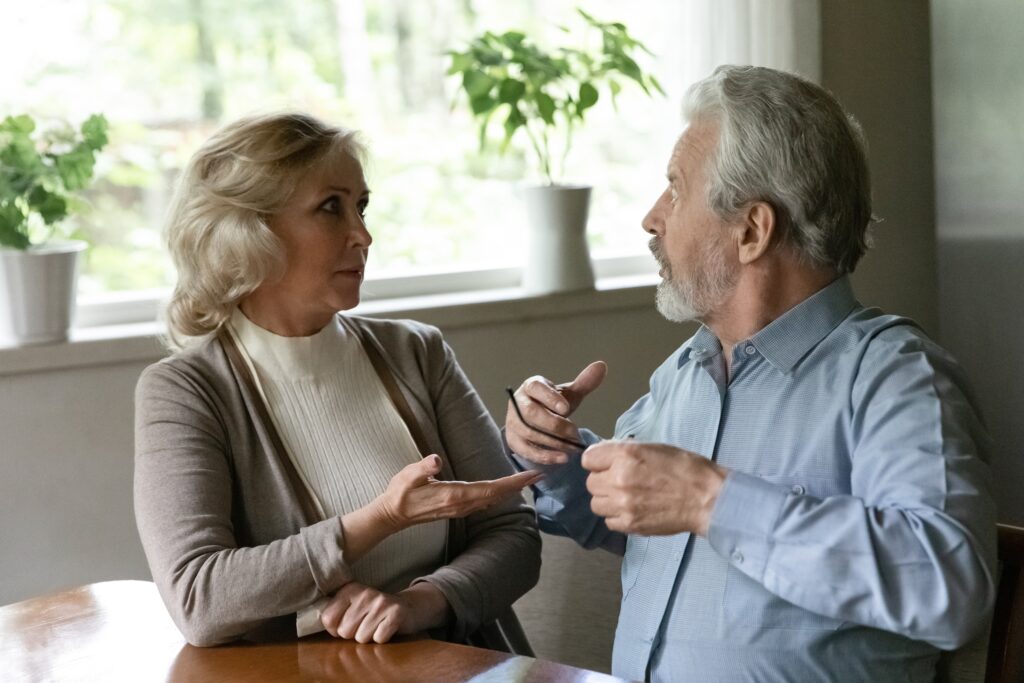Explore the unspoken truths behind loveless marriages and find the courage to embrace a better future.

Living in a loveless marriage can be one of the most emotionally draining experiences a woman endures. The disconnection seeps in slowly, often unnoticed until it becomes the uncomfortable norm. To survive emotionally, many women lean on subtle, sometimes unconscious lies they tell themselves. These beliefs act as shields, buffering them from the pain of a relationship that no longer feels like a partnership. But over time, those same lies can deepen the wounds, prolong the suffering, and keep them stuck in a reality that offers little joy or emotional nourishment.
By bringing awareness to these falsehoods, women can begin to unlearn the narratives that keep them confined in marriages that no longer serve their well-being. The path to healing often starts with honesty—the kind that requires courage and a willingness to face uncomfortable truths. Below are 15 of the most common lies women tell themselves when they’re in loveless marriages, along with compassionate reflections to help challenge those beliefs and make space for growth, freedom, and self-love.
1. “I’m Staying For The Sake Of The Kids”

This statement is often said with the best of intentions. Many women believe that keeping the family under one roof protects their children from pain. But children are intuitive—they sense tension, emotional withdrawal, and strained silence. They learn about love by watching their parents, and when that example is cold or disconnected, it can shape how they view relationships for years to come. Staying in a joyless marriage for the sake of appearances may teach children to tolerate unhappiness instead of seeking healthy, loving connections.
Rather than sacrificing your well-being for them, consider what message you’re really sending. A mother who chooses her happiness and models strength, honesty, and emotional authenticity often gives her children a deeper gift. By witnessing a parent who refuses to accept unhappiness as the norm, kids learn to advocate for their own self-worth and emotional health. Sometimes, leaving isn’t breaking the family—it’s redefining what a loving, supportive family can look like, as reported at Parents.
2. “Every Marriage Loses Passion Eventually”

It’s true that relationships evolve over time, and the intensity of new love doesn’t last forever. But that doesn’t mean passion has to disappear completely. Believing that every marriage ends in monotony can lull you into a state of resignation, causing you to stop trying, stop asking for what you need, and stop expecting emotional or physical intimacy. This mindset leads many women to accept a half-life of companionship without connection, assuming it’s simply the way all long-term marriages are destined to go.
In reality, many couples find ways to rekindle intimacy through shared interests, honest communication, and small, daily efforts to remain emotionally connected. Passion doesn’t vanish by default—it fades when it’s ignored. If you’re feeling disconnected, explore whether you’re both willing to put energy into rebuilding. Dismissing the need for closeness as a normal stage in marriage may prevent you from experiencing a relationship that’s deeply rewarding at any stage of life, as stated at PsychCentral.
3. “This Is Just How He Shows Love”

Many women stay in painful relationships by convincing themselves that their husband’s emotional distance, irritability, or lack of support is just his way of loving. Over time, this rationalization turns into an excuse that keeps them from acknowledging how unfulfilled they truly feel. Love should never feel like chronic disappointment or indifference. While everyone expresses affection differently, a pattern of emotional unavailability or criticism is not a love language—it’s a warning sign that something needs to change.
It’s important to ask yourself whether his behavior leaves you feeling seen, heard, and cared for. If the answer is no, then his way of showing love may not be meeting your needs—and that matters. You have the right to express what feels good and what feels hurtful, and to expect that a loving partner will try to bridge that gap. Accepting consistent emotional neglect in the name of “style” only reinforces the belief that you don’t deserve better, as mentioned at Healthline.
4. “At Least He’s Not Abusive”

It’s easy to fall into the trap of comparing your situation to the worst-case scenario. If your husband isn’t screaming, hitting, or overtly cruel, it might seem like you should be grateful. But just because your relationship doesn’t fit the traditional definition of abuse doesn’t mean it’s healthy or loving. A marriage devoid of emotional intimacy, mutual support, or shared joy can still harm your spirit and sense of self.
Emotional neglect, chronic indifference, or dismissive behavior are serious issues that deserve attention. You don’t have to wait until something becomes extreme to give yourself permission to question whether it’s right for you. You’re allowed to want more than just the absence of harm—you’re allowed to want presence, care, and connection. Settling for “not abusive” should never be the bar by which you measure a relationship’s worth.
5. “It’s Too Late For Me To Start Over”

The fear of starting over can feel paralyzing, especially later in life when the idea of rebuilding seems overwhelming. But telling yourself it’s too late keeps you tethered to a version of life that no longer brings you peace. It also overlooks the countless women who’ve made empowering changes in midlife or beyond. Your age doesn’t define your capacity for growth, happiness, or reinvention.
What matters most is your willingness to believe that the rest of your life can look different. Choosing yourself—even after decades of putting others first—is an act of bravery. If your current relationship is draining your energy and diminishing your joy, then beginning again might not just be an option—it might be a necessity. You still have time, and you still deserve happiness.
6. “All Men Are The Same”

This belief often surfaces as a defense mechanism to justify staying with someone who makes you feel unloved or unseen. If you convince yourself that all men are emotionally unavailable or incapable of showing love, you reduce the sting of your current situation by pretending there’s no better alternative. But this sweeping generalization not only closes your heart—it also keeps you from imagining or believing in something healthier.
The truth is, not all men are the same. There are emotionally intelligent, kind, and loving partners who are capable of creating deep connections. The world is full of people who value communication, affection, and mutual respect. Holding on to this lie keeps you trapped in hopelessness. Letting go of it allows you to dream again—and that dream could become your new reality.
7. “I’ve Invested Too Much To Leave Now”

It’s understandable to feel reluctant to walk away from a marriage where you’ve invested years of time, energy, and shared experiences. But staying simply because of what’s already been spent is known as the “sunk cost fallacy”—an idea that traps you in an unhappy present because of the past. In truth, continuing to invest in something that no longer nourishes you only deepens the loss.
Instead of asking how much you’ve given, ask yourself what you still have left to give—and whether this relationship is worthy of it. Reclaiming your time and emotional energy is not a betrayal of your past effort—it’s a decision to honor your future. You have every right to take what you’ve learned and use it to build a more fulfilling life moving forward.
8. “I Don’t Deserve Better”

This painful belief often stems from childhood wounds, toxic relationships, or years of internalized self-doubt. It convinces you that love, respect, and kindness are for other people—not for you. As long as you believe this lie, you’ll continue to accept crumbs and convince yourself it’s a feast. But the truth is, you are just as worthy of love and joy as anyone else.
Healing this belief begins with small acts of self-compassion. Start by noticing the way you speak to yourself. Would you talk to your best friend the way you talk to you? Probably not. Over time, nurturing your self-worth can help you break free from the cycle of accepting less and begin attracting more. The first step to finding better is believing you deserve it.
9. “I Can’t Afford To Leave”

Financial fear is one of the most common reasons women remain in unhappy marriages. The uncertainty of housing, employment, or supporting children alone can be terrifying. But fear alone shouldn’t determine your future. There are more resources and support systems available today than ever before, from financial aid to job training programs and legal assistance for women transitioning out of marriage.
Begin by gathering information—talk to a financial advisor, look into local organizations, or reach out to supportive friends and family. Break the process down into manageable steps. You may not have to leave tomorrow, but starting the journey toward independence today can empower you to make choices based on hope, not fear. You are capable of building a life that supports you.
10. “No Marriage Is Perfect”

While it’s true that no relationship is flawless, this truth is often twisted into a justification for enduring a lack of affection, respect, or partnership. Using imperfection as a shield prevents you from facing the reality of deep emotional disconnect. A healthy marriage isn’t perfect, but it should be rooted in mutual love, trust, and emotional safety.
The difference between imperfection and dysfunction is significant. If you’re constantly feeling lonely, resentful, or emotionally drained, it’s not just a rough patch—it might be a sign that your needs aren’t being met. You don’t have to settle for a relationship that brings more pain than joy under the guise of “nobody’s perfect.”
11. “I’m Too Afraid To Be Alone”

Loneliness is a powerful fear that can cloud your sense of possibility. It can make even an unhappy marriage feel safer than the unknown. But there is a profound difference between being alone and being lonely. Many women find that when they leave a loveless relationship, the solitude they once feared becomes a sacred space for healing, creativity, and rediscovery.
Being alone gives you the opportunity to connect with yourself without compromise. It allows you to choose your path without walking on eggshells or dimming your light. You might be surprised by how empowering it feels to make decisions based solely on your needs and desires. The fear of being alone often fades once you experience the peace and strength that come with self-reliance.
12. “Leaving Would Hurt Too Many People”

When contemplating a separation, it’s natural to worry about how others will react—especially children, family members, or mutual friends. But staying in an emotionally disconnected marriage can also hurt those around you. Children, in particular, can absorb unspoken pain, resentment, or emotional distance between their parents and carry that burden into their own relationships.
Your happiness matters. When you prioritize your well-being, you set healthier boundaries and create space for authentic connection with the people you love. Leaving doesn’t mean you’re selfish—it means you’re willing to choose truth over appearances. While some people may struggle with your decision at first, those who truly care about you will want to see you thrive.
13. “Things Will Get Better Eventually”

Hope is a beautiful thing—but hope without action can become a trap. Many women stay for years, clinging to the possibility that things will improve on their own. They wait for their partner to change, for circumstances to shift, or for a turning point that never comes. In the meantime, life keeps moving, and the days of feeling emotionally starved pile up.
It’s important to ask whether you’ve already tried everything within your power to fix the relationship. If your efforts are consistently met with resistance, apathy, or empty promises, then waiting becomes a form of self-abandonment. Change is only possible when both people are willing to show up and do the work. If that isn’t happening, it may be time to redirect your hope toward creating a life that nurtures your soul.
14. “I’m Staying Because Of My Vows”

Marital vows are a sacred commitment—but they are also built on mutual respect, love, and emotional safety. When those foundational values are no longer present, the meaning behind the vows may be compromised. Staying in a painful marriage simply because you promised to do so can become an act of martyrdom rather than love.
You are not breaking your vows by leaving a relationship that causes you harm. Instead, you are honoring your deeper vow—to live a life that is whole, healthy, and true. Reflect on whether both of you have upheld your end of the partnership. If you find yourself doing all the emotional labor, it may be time to redefine what commitment really means to you.
15. “This Is As Good As It Gets”

Perhaps the most heartbreaking lie of all is the belief that this is the best you can hope for. It whispers that love has passed you by and that anything better is a fantasy. But this belief is born from fear, not fact. When you tell yourself this lie, you shut down the part of you that dares to imagine a better life.
The truth is, life still has beauty, joy, and deep connection to offer—but only if you’re willing to open yourself to it. You don’t need to know exactly what the future holds to start moving toward it. Trust that by choosing truth over resignation, you are planting seeds for a richer, more meaningful existence. You deserve more than “good enough.” You deserve to thrive.
